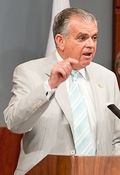 Washington lobbyists who planned to fight distracted driving laws and legislation have backed down after a scolding from the head of the U.S. Department of Transportation.
Washington lobbyists who planned to fight distracted driving laws and legislation have backed down after a scolding from the head of the U.S. Department of Transportation.
The would-be DRIVE Coalition withdrew its proposal for a corporate-backed campaign after the DOT’s Ray LaHood blasted the initiative at a press conference, dubbing it “a new effort to rile up corporate America and undermine the achievements of our campaign against distracted driving.”
A spokesman for DRIVE said it had achieved the goal of expanding the distracted driving debate beyond electronic devices. The lobbyists had called the tech and auto industries “collateral damage” in the national movement to rein in distracted drivers.
News of the proposal from the Seward Square Group made national headlines last week after an investigative web site posted the group’s recruitment pitch to wireless, tech, insurance and auto companies.
The media-conscious LaHood quickly scheduled a press conference for after the holiday break.
At Wednesday’s DOT press conference, LaHood revisited the dangers of telephoning while driving, saying 28 percent of wrecks were linked to cell phones. “To suggest (cell phone use is not dangerous) is to put your head in the sand. To spend considerable resources to suggest otherwise is a glaring waste.
“That’s why I was stunned to read that anyone would organize an effort to undercut road safety, much less declare that the ‘auto, tech, and insurance industries have become collateral damage.’ ”
Jim Hall, who headed the National Transportation Safety Board for the Clinton administration, attended the press conference to deny the DRIVE coalition’s claim that he would have spearheaded the campaign, saying his views were misrepresented. Hall, however, does work with the Seward Square Group.
Considering the publicity generated by the plan, it’s not surprising that Babak Zafarnia, the would-be coalition’s spokesman, declared a victory of sorts:
“We are pleased that the concept has met its goal of expanding dialogue on distracted driving, therefore the proposed coalition is no longer being pursued,” he said in a statement. “We commend Secretary LaHood for his leadership in bringing a comprehensive view to this complex issue.”
Meanwhile, Ford Motor Co. said it will add a “do not disturb” function to its Sync communications system. The intent is to block functions “that are not relevant to the task of driving while the vehicle is in motion,” Ford said.
That includes incoming phone calls and text messages, which are routed for later access.
The do not disturb button will be added to the carmaker’s controversial My Ford Touch system (an upgraded Sync), which includes a Web browser. Ford said drivers won’t be able to use its Internet functions while in motion. Typing on a keyboard and entering destination details on GPS also are blocked to drivers.
LaHood recently expressed concerns about the new media applications being added to motor vehicles in an effort to please the wired generations.

